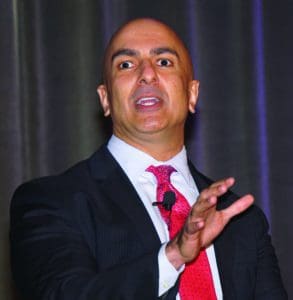
“Overreaction” is exactly the response the federal government and the Federal Reserve needs to adopt to combat the negative economic impact of the COVID-19 contagion, said Neel Kashkari, president of the Federal Reserve Bank of Minneapolis, in a televised interview March 22.
Reflecting on the Fed’s response to the 2008 economic collapse, Kashkari said “we were always too slow and too timid in responding to the crisis.” Kashkari was assistant Treasury Secretary during the 2008 financial crisis and was in charge of the Troubled Asset Relief Program.
“We didn’t know how bad it was going to get and we didn’t want to overreact, and it turned out it got really, really bad and the right answer should have been overreacting to try to avoid the devastating recession that ended up happening.”
Overreacting is a term healthcare policymakers have used to help Americans understand “flattening the curve,” which is the idea of slowing the spread of COVID-19 by staying home so the healthcare system isn’t overwhelmed with patients. If population control measures allow the healthcare system to meet the needs of coronavirus patients, experts have said detractors of the plan would say “they overreacted.”
But Kashkari called on healthcare policymakers, fiscal policymakers, and the Fed to err on the side of overreacting to avoid the worst economic outcomes.
In the past few weeks, Kashkari said the Fed has seen stress in the treasury market, stress in the market for mortgage-backed securities and the commercial paper market, as well as in the municipal and corporate bond markets. Despite bold action by the Fed only a week earlier, slashing rates to near zero and pledging $700 billion to buy bonds, Kashkari admitted, “we’re not out of the woods yet.”
In Washington, where lawmakers and the President promised swift passage of an economic stimulus to provide relief to suddenly unemployed workers and now-shuttered small businesses, not to mention the entirety of the travel and hospitality industry, Senators failed to reach a compromise. Wall Street futures plunged after a key Senate procedural vote failed.
Meanwhile, it was reported that Sen. Rand Paul (R-KY) tested positive for coronavirus. He and three other Senate Republicans have self-quarantined, including Utah Senator Mitt Romney.
Admitting the country was at the doorstep of a recession, Kashkari said there were too many unknowns to say how long the economy would falter, or how deep a recession would be. “Millions of people are going to lose their jobs and that’s what’s so scary about this,” he said.
With 300,000 people firing first claims for unemployment last week nationwide, Kashkari warned that the bottom may be hard to see. “If this is a year long shutdown, this could be very damaging to the U.S. economy,” Kashakri said. “The economy can bounce back fairly quickly. It’s the workers that take time. That’s one of the other lessons from 2008. It took more than 10 years to put America fully back to work relative to where they were before the crisis. That’s what we have to try to avoid. We can’t have another 10 year recovery.”
